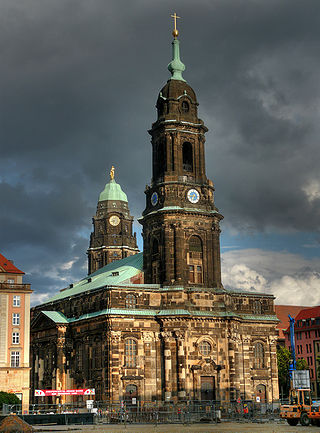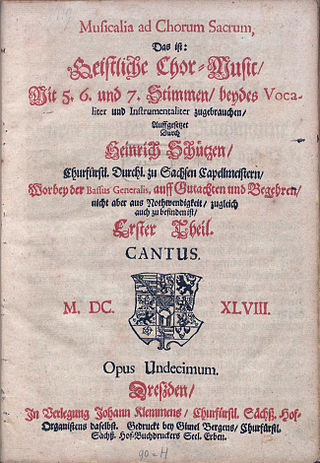
Gottfried August Homilius was a German composer, cantor and organist. He is considered one of the most important church composers of the generation following Bach's, and was the main representative of the empfindsamer style.

Rudolf Mauersberger was a German choral conductor and composer. His younger brother Erhard was also a conductor and composer.

Ludwig Güttler is an internationally known German virtuoso on the Baroque trumpet, the piccolo trumpet and the corno da caccia. As a conductor, he founded several ensembles including the chamber orchestra Virtuosi Saxoniae. His name is sometimes written in English as Ludwig Guttler.

The Dresden Kreuzkirche is a Lutheran church in Dresden, Germany. It is the main church and seat of the Landesbischof of the Evangelical-Lutheran Church of Saxony, and the largest church building in the Free State of Saxony. It also is home of the Dresdner Kreuzchor boys' choir.

The Dresdner Kreuzchor is the boys' choir of the Kreuzkirche in Dresden, Germany. It has a seven-century history and a world-wide reputation. Today, the choir has about 150 members between the ages of 9 and 19, from Dresden and the surrounding region. The boys attend the Kreuzschule in Dresden. They are also called "Kruzianer".
Samuel Rüling was a German composer and poet in the early 17th century.
Annette Markert is a German classical mezzo-soprano and contralalto.

Daniel Ochoa is a German baritone.
Marcus Ullmann is a German classical tenor.
Jörg Duda is a German composer of classical music.

Hans-Christoph Rademann is a German choral conductor, currently the director of the Dresdner Kammerchor and the Internationale Bachakademie Stuttgart.
Die sieben Worte Jesu Christi am Kreuz, SWV 478, is a German-language musical setting of the seven sayings of Jesus on the cross by Heinrich Schütz. It was written in Weissenfels around 1645 and revised in 1657. Schütz set the text of the biblical words in their context, framed by two stanzas from Johann Böschenstein's hymn "Da Jesus an dem Kreuze stund", as an oratorio or Passion cantata. He scored it for five voices (SATTB), five instrumental parts and continuo. The original title reads: Die Sieben Worte unsers lieben Erlösers u. Seeligmachers Jesu Christi, so er am Stamm des Hl. Kreuzes gesprochen.

Geistliche Chormusik is a collection of motets on German texts for choir by Heinrich Schütz. It was printed in Dresden in 1648 as his Opus Undecimum, and comprises 29 individual settings for five to seven voices, which were assigned numbers 369 to 397 in the Schütz-Werke-Verzeichnis (SWV). The original title was Geistliche Chor-Music, Erster Theil which indicates that Schütz planned a second part. It is also known as Geistliche Chor-Music 1648. The collection contains earlier and new works and a German arrangement of a motet by Andrea Gabrieli.
Matthias Herrmann is a German musicologist and university professor.
Hans Karl Ferdinand John is a German musicologist and former university professor.
Christian Münch is a German composer, organist, pianist and conductor.
Lothar Voigtländer is a German composer.

Manfred Weiss was a German composer especially of symphonies, concertos and vocal music, based in Dresden. He taught composition and music theory at the Hochschule für Musik Carl Maria von Weber from 1959, as professor from 1983 to 1997, influencing generations of composers, and instrumental in the restructuring of the music department after the German reunification.
Jauchzet dem Herren, alle Welt, SWV 36, is a choral setting of Psalm 100 in German for double choir by Heinrich Schütz. It is one of the Psalmen Davids, published in 1619. The psalm setting has been performed and recorded internationally.

Gottfried August Homilius composed Passions for Good Friday services at the Kreuzkirche in Dresden where he was music director (Kreuzkantor) from 1755 to 1785, including oratorios based on the gospels of Matthew and John, Luke and Mark in German. While these works were neglected, their revival began at the Kreuzkirche and led to publications, performances and recordings. Reviewers agree that the compositions in the style of Empfindsamkeit deserve attention.









